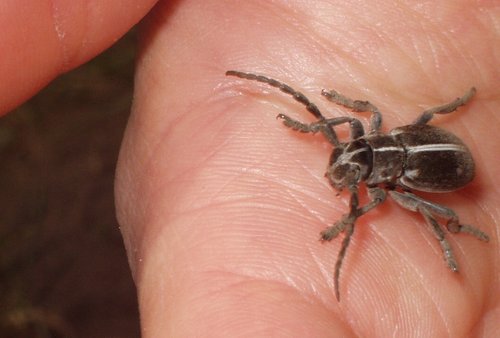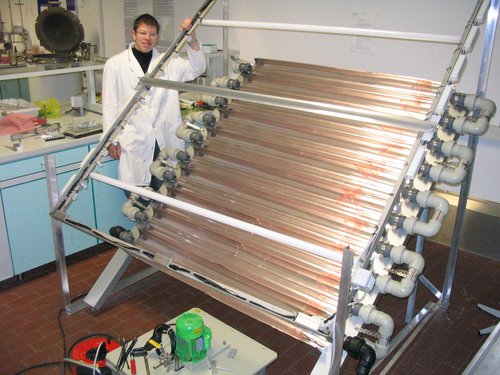Doctoral Study Programme Environmental Sciences
| Study programme: | Doctoral study programme Environmental Sciences |
|---|---|
| Main fields of study: | Environmental Sciences |
| Programme code: | 3OK |
| Programme cycle: | Third cycle doctoral degree |
| Name of the qualification: | Doctoral diploma |
| Qualification title: | Doctor of Philosophy |
| Qualification abbreviation: | Ph.D. |
| Final examination: | no |
| Dean: | prof. dr. Martina Bergant Marušič |
| Programme director: | doc. dr. Iain Robert White |
| ECTS coordinator: | prof. dr. Iztok Arčon |
Programme description
Environmental Sciences is doctoral degree study programme.
The courses are held in English language.
The Senate of the University of Nova Gorica at its 75th session held on 18 January 2017 approved the extension of the third cycle Doctoral degree study programme Environmental Sciences from the current three years (180 ECTS) to four years (240 ECTS).
The four-year doctoral programme started in the academic year 2017/2018.
Students who are currently enrolled in the three-year study programme will complete studies at the three-year programme.
During the research work, students can focus on studying basic phenomena in the environment, as well as improving technologies that reduce environmental pollution, as well as the development and introduction of new techniques for detecting pollutants in the environment.
In addition to science-technical content, students can devote themselves to researching the impact of human activities on the natural environment and the quality of human being in it, examining the consequences of changes in the environment in the future, etc.
Information for students
Intensive Slovenian language course
Admission requirements
To qualify for entry into the Doctoral degree study programme Environmental Sciences, applicants must satisfy the following admission requirements:
- have completed a 2nd cycle master’s study preogramme;
- have completed at least a four-year academic undergraduate programme accredited with 240 ECTS credits;
- have completed a uniform five year master’s study programme accredited with 300 ECTS credits;
- have completed a specialization after previously finished professional study programme, and had passed additional study obligations within 30 to 60 ECTS credit points;
- have completed an equivalent program abroad;
If the number of applicants exceeds the 20 available slots, they are selected based on previous academic achievement.
The condition for enrolling
- In the first year, the student must have completed the following study requirements: Trends in Environmental Sciences (30ECTS) and Research work I (30 ECTS). / (For 3 and 4 year programme)
In the first year the student has to submit an application to approve the topic of the argumentation.
The condition for enrolling in the second year is completion of 60 ECTS credit points.
-
In the second year, the student must have completed the following study requirements: Research work II (30 ECTS) and General elective courses (30ECTS). / (For 3 and 4 year programme)
In the second year, the student has to submit an application to approve the topic of the dissertation
The condition for enrolling in the third year is completion of 120 ECTS credit points. -
In the third year, the student focuses exclusively on Research work III (30 ECTS), which results in a successful defence of the doctoral dissertation (30 ECTS). / (For 3 year programme).
- In the third year, the student focuses exclusively on Research work 3 (60 ECTS). / (For 4 year programme).
The condition for enrolling in the fourth year is completion of requirements of all three years (180 ECTS credit points).
- In the fourth year, the student focuses exclusively on Research work IV (30 ECTS), which results in a successful defence of the doctoral dissertation (30 ECTS). / (For 4 year programme).
The student must collect together 240 ECTS. / (For 4 year programme).
Conditions for repeating the year and extending the deadline for completing the course
Repetition of the year is not possible. Students who fail to complete the study in three years can be awarded by the Scientific Council of the Doctoral degree study programme Environmental Science after three years, while checking the actuality of the contents of the subjects that the student was listening during his studies.
Programming Provisions
Horizontal transitions to the Doctoral degree study programme Environmental Sciences are possible from other doctoral programs in the fields of natural sciences, engineering, biotechnology and medicine, in accordance with the law on higher education, criteria for transitions between study programs and other regulations.
The study obligations in the scope of 60 credits are granted to the graduates of the previous study programs for acquiring a master's degree or specialization after completing the study program for obtaining a university degree in doctoral studies in the third-level program.
Conditions for Completion of Studies
A condition to approach to the dissertation defence is that the student must submit a scientific article in addition to the valid provisions of the study program in the field of his / her research done within the doctoral study program. The article must be prepared in one of the extended foreign languages and sent or received for publication in an international scientific journal with an impact factor.
All the exams, the program prescribed seminar and the successful defense of the doctoral dissertation are required for completing the study.
The student can raise the topic of doctoral dissertation when he has a mandatory seminar. The subject is approved by the panel on the basis of the application, which also determines the commission for defense. With a positive assessment of the dissertation and her defense the student completes the study.
Educational and professional goals
Protection of the environment demands an explicitly multidisciplinary approach and therefore adequately educated and trained experts are needed in the areas of environmental research, technology, conservation, management and policy development. One of the crucial problems in solving the environment issues is the lack of experts with appropriate multidisciplinary knowledge, who could successfully link together the experts with distinctive knowledge in natural and technical sciences on one side and the managers, lawyers and similar professionals on the other side. Therefore similar study programmes on undergraduate and also on graduate level are common worldwide. For this reason the main objective of this study programme is education of top experts with the multidisciplinary knowledge in the fields of environmental sciences.
The study programme consists of the compulsory seminar, which introduces the student into the area of his specialization, elective courses on atmospheric, aquatic or soil science, and elaboration of doctoral thesis. The thesis is tightly linked to intensive and high quality research during which various environmental phenomena and concrete problems can be investigated. The main focus is on topics such as the development and improvement of technologies for reduction of environmental pollution, the development and application of new technologies and methods for detection and monitoring of pollutants in the environment, ecotoxicology, renewable energy and other resources, and sustainable development.
Courses refresh
1. year
| Compulsory courses | Hours | ECTS |
|---|---|---|
| Research work I | 900 | 30 |
| Trends in Environment Sciences | 900 | 30 |
2. year
| Compulsory courses | Hours | ECTS |
|---|---|---|
| Elective contents | 900 | 30 |
| Research work II | 900 | 30 |
| Ellective subjects | Hours | ECTS |
| Selected Topics in Air Pollution | 300 | 10 |
| Selected Topics in Nature Protection and Biodiversity Conservation | 300 | 10 |
| Selected Topics in Soil Pollution | 300 | 10 |
| Selected Topics in Water Pollution | 300 | 10 |
| Sustainability and sustainable development | 300 | 10 |
3. year
| Compulsory courses | Hours | ECTS |
|---|---|---|
| Research work 3 | 1800 | 60 |
4. year
| Compulsory courses | Hours | ECTS |
|---|---|---|
| Dissertation | 900 | 30 |
| Research work IV | 900 | 30 |



